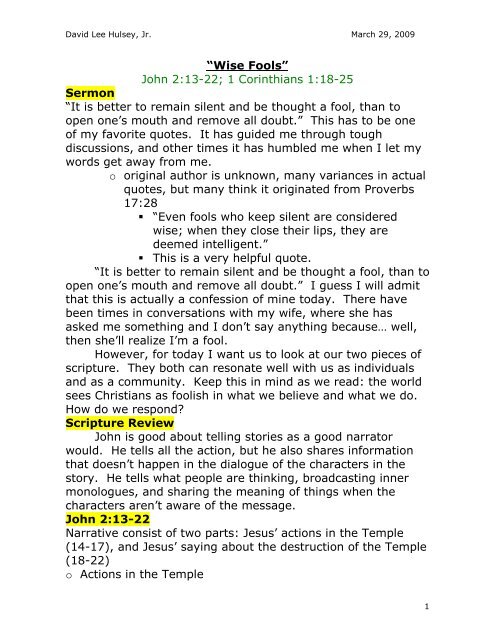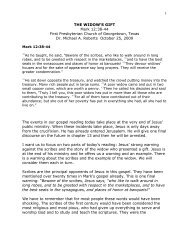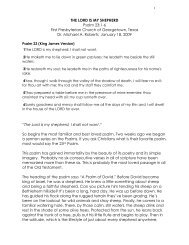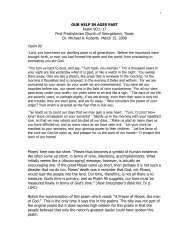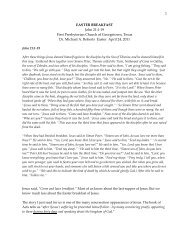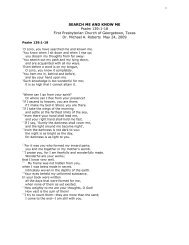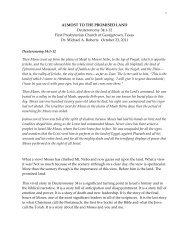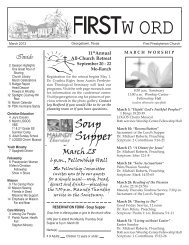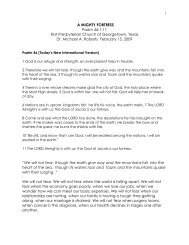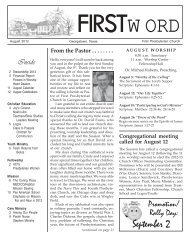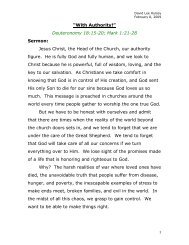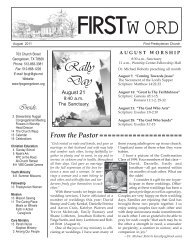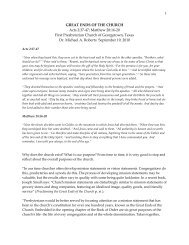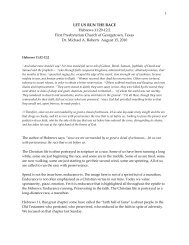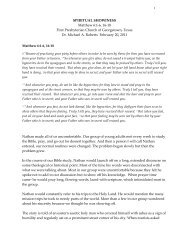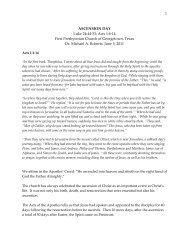âWise Foolsâ John 2:13-22; 1 Corinthians 1:18-25 Sermon âIt is ...
âWise Foolsâ John 2:13-22; 1 Corinthians 1:18-25 Sermon âIt is ...
âWise Foolsâ John 2:13-22; 1 Corinthians 1:18-25 Sermon âIt is ...
You also want an ePaper? Increase the reach of your titles
YUMPU automatically turns print PDFs into web optimized ePapers that Google loves.
David Lee Hulsey, Jr. March 29, 2009<br />
“W<strong>is</strong>e Fools”<br />
<strong>John</strong> 2:<strong>13</strong>-<strong>22</strong>; 1 <strong>Corinthians</strong> 1:<strong>18</strong>-<strong>25</strong><br />
<strong>Sermon</strong><br />
“It <strong>is</strong> better to remain silent and be thought a fool, than to<br />
open one’s mouth and remove all doubt.” Th<strong>is</strong> has to be one<br />
of my favorite quotes. It has guided me through tough<br />
d<strong>is</strong>cussions, and other times it has humbled me when I let my<br />
words get away from me.<br />
o original author <strong>is</strong> unknown, many variances in actual<br />
quotes, but many think it originated from Proverbs<br />
17:28<br />
“Even fools who keep silent are considered<br />
w<strong>is</strong>e; when they close their lips, they are<br />
deemed intelligent.”<br />
Th<strong>is</strong> <strong>is</strong> a very helpful quote.<br />
“It <strong>is</strong> better to remain silent and be thought a fool, than to<br />
open one’s mouth and remove all doubt.” I guess I will admit<br />
that th<strong>is</strong> <strong>is</strong> actually a confession of mine today. There have<br />
been times in conversations with my wife, where she has<br />
asked me something and I don’t say anything because… well,<br />
then she’ll realize I’m a fool.<br />
However, for today I want us to look at our two pieces of<br />
scripture. They both can resonate well with us as individuals<br />
and as a community. Keep th<strong>is</strong> in mind as we read: the world<br />
sees Chr<strong>is</strong>tians as fool<strong>is</strong>h in what we believe and what we do.<br />
How do we respond?<br />
Scripture Review<br />
<strong>John</strong> <strong>is</strong> good about telling stories as a good narrator<br />
would. He tells all the action, but he also shares information<br />
that doesn’t happen in the dialogue of the characters in the<br />
story. He tells what people are thinking, broadcasting inner<br />
monologues, and sharing the meaning of things when the<br />
characters aren’t aware of the message.<br />
<strong>John</strong> 2:<strong>13</strong>-<strong>22</strong><br />
Narrative cons<strong>is</strong>t of two parts: Jesus’ actions in the Temple<br />
(14-17), and Jesus’ saying about the destruction of the Temple<br />
(<strong>18</strong>-<strong>22</strong>)<br />
o Actions in the Temple<br />
1
David Lee Hulsey, Jr. March 29, 2009<br />
V14-16 are actually one long sentence in Greek text<br />
(creates a mood of urgency and haste, underscoring<br />
the intensity of Jesus’ actions)<br />
14 In the temple he found people selling cattle, sheep,<br />
and doves, and the money changers seated at their<br />
tables. 15 (And) Making a whip of cords, he drove all<br />
of them out of the temple, both the sheep and the<br />
cattle. (And) He also poured out the coins of the money<br />
changers and overturned their tables. 16 (And) He told<br />
those who were selling the doves, “Take these things<br />
out of here! Stop making my Father’s house a<br />
marketplace!”<br />
Reason for money changers and selling animals<br />
• We have m<strong>is</strong>conceptions of th<strong>is</strong> scene. In the<br />
musical Jesus Chr<strong>is</strong>t Superstar, I remember th<strong>is</strong><br />
scene where one of the tables in the Temple had<br />
guns, knives, grenades, and all other kinds of<br />
weapons that were being sold. It’s a little<br />
extreme.<br />
• While most of us might think that the Jews have<br />
simply started using the Temple as a marketplace<br />
for venders, those who involved are actually<br />
involved for worship related reasons<br />
• Since Passover was a pilgrimage feast, many of<br />
those coming to worship in the Temple would have<br />
journeyed a great d<strong>is</strong>tance and would not have<br />
brought animals with them. They needed to buy<br />
animals in Jerusalem in order to participate in the<br />
temple worship.<br />
• Similarly, the temple tax could not be paid in reek<br />
or Roman coinage because of the human image<br />
(the emperor’s head) on these coins, and foreign<br />
coinage had to be changed into the legal Tyrian<br />
currency in Jerusalem.<br />
• So the sale of animals and the changing of money<br />
were necessary if the worship was to proceed.<br />
2
David Lee Hulsey, Jr. March 29, 2009<br />
Most biblical commentators would say th<strong>is</strong> <strong>is</strong> a public<br />
demonstration against the material<strong>is</strong>m that had<br />
become part of the Temple worship services.<br />
Jesus’ indignation wasn’t directed toward those<br />
engaged in worship, but those detracting from it.<br />
There’s also another reason. In the other 3 gospels,<br />
they focus on the d<strong>is</strong>tortion of a place of worship into a<br />
“den of robbers,” and th<strong>is</strong> <strong>is</strong> where Jesus quotes Isaiah<br />
56:7 and Jeremiah 7:11<br />
But <strong>John</strong> doesn’t quote the OT and instead Jesus<br />
alludes to Zechariah 14:21 (“And there shall no longer<br />
be traders in the house of the Lord of hosts on that<br />
day.”<br />
o Jesus in not only pointing out the abuses of th<strong>is</strong><br />
temple system, he <strong>is</strong> <strong>is</strong>suing a powerful challenge to<br />
the very authority of the Temple and its worship.<br />
V. 17 quickly shifts the focus to the d<strong>is</strong>ciples<br />
The d<strong>is</strong>ciples aren’t involved in any of the action, but<br />
act as interpretive witnesses<br />
o The last few verses in th<strong>is</strong> passage focus on what <strong>is</strong> being<br />
said about the “Temple”<br />
<strong>18</strong> The Jews then said to him, “What sign can you show<br />
us for doing th<strong>is</strong>?”<br />
“Show us a sign” meaning they asked for a sign of<br />
authority to warrant h<strong>is</strong> actions. What gives him the<br />
right to mess up their worship?<br />
“The Jews” here represent all those present who<br />
question Jesus and do not know him.<br />
19 Jesus answered them, “Destroy th<strong>is</strong> temple, and in<br />
three days I will ra<strong>is</strong>e it up.” 20 The Jews then said, “Th<strong>is</strong><br />
temple has been under construction for forty-six years,<br />
and will you ra<strong>is</strong>e it up in three days?” 21 But he was<br />
speaking of the temple of h<strong>is</strong> body.<br />
Th<strong>is</strong> reference to destroying the temple <strong>is</strong> not made<br />
directly in the other gospels, but comes up indirectly<br />
through the testimony of false witnesses at Jesus’ trial<br />
and in the taunting of Jesus on the cross<br />
3
David Lee Hulsey, Jr. March 29, 2009<br />
The Jews only see the surface meaning of the temple,<br />
but the greek verb Jesus uses to speak of the ra<strong>is</strong>ing of<br />
the Temple (egeiro) <strong>is</strong> also used on a symbolic level to<br />
speak of resurrection<br />
Since for Juda<strong>is</strong>m the Temple <strong>is</strong> (the place where<br />
something happens) the locus of God’s presence on<br />
earth, v. 21 suggests that Jesus’ body <strong>is</strong> now the locus<br />
of God.<br />
<strong>John</strong> often writes in a way that provides the reader with<br />
insight and information the characters in the stories do<br />
not have, so verse 21 enables the reader to see the<br />
sign the “Jews” m<strong>is</strong>s: Jesus has the authority to<br />
challenge the temple system because he <strong>is</strong> the locus of<br />
God’s presence on earth.<br />
Verse <strong>22</strong>, like v. 17, focuses on the interpretive witness<br />
of the d<strong>is</strong>ciples (<strong>22</strong> After he was ra<strong>is</strong>ed from the dead,<br />
h<strong>is</strong> d<strong>is</strong>ciples remembered that he had said th<strong>is</strong>; and<br />
they believed the scripture and the word that Jesus had<br />
spoken.), but unlike v. 17, v.<strong>22</strong> they won’t understand<br />
the meaning of th<strong>is</strong> until after Jesus’ resurrection. In<br />
<strong>John</strong> 14:26, Jesus prom<strong>is</strong>es that the Holy Spirit “will<br />
teach you all things and will remind you of everything I<br />
have said to you.” In <strong>John</strong>, remembrance <strong>is</strong> active<br />
reflection on the past in the light of the resurrection<br />
with the aid of the Spirit. Such reflection leads to faith<br />
and a deeper understanding.<br />
Now th<strong>is</strong> <strong>is</strong> not say that since Chr<strong>is</strong>t <strong>is</strong> now the locus of<br />
God that there <strong>is</strong> not need to gather together at the<br />
church. It <strong>is</strong> saying that when you come to church to<br />
worship, focus on Jesus Chr<strong>is</strong>t, focus on God, and let<br />
the Holy Spirit reveal the meaning and significance that<br />
comes from hearing the Living Word of God.<br />
But we have to be careful. It <strong>is</strong> probable, it <strong>is</strong> common<br />
that we find ourselves in the same state as the Temple back in<br />
the time of Jesus. It happens sometimes when we come to<br />
church because it’s part of our schedule and we have some<br />
business we need to do with fellow church members. We have<br />
meetings coming up, I volunteered to help with a fundra<strong>is</strong>er,<br />
4
David Lee Hulsey, Jr. March 29, 2009<br />
we have to set up the Fellowship Hall for a dinner after the<br />
11:00 service, I have to help Joy do something with the kids.<br />
There <strong>is</strong> a lot that <strong>is</strong> on our plate and these things are<br />
indeed important and need to be done, and it can be easy to<br />
forget that we gather Sunday mornings to celebrate what God<br />
has done for us and to pra<strong>is</strong>e God for who God <strong>is</strong>. I say th<strong>is</strong><br />
because every time I help in worship, I have to work diligently<br />
on making sure my focus <strong>is</strong> on worshiping God, and not on<br />
worrying about my notes, or speaking slowly and clearly so<br />
everyone will think I am doing a good job. These things are<br />
important to me, but the reason I’m doing all th<strong>is</strong> <strong>is</strong> because<br />
we need to worship God.<br />
What do you think happened to Temple after that day<br />
Jesus came storming in? It probably went back to doing things<br />
like normal, but I’m sure people refocused their thinking, and<br />
thought more intently about worshipping God when they<br />
returned to the Temple.<br />
And it <strong>is</strong> not the case that everyone said, “Yeah, Jesus <strong>is</strong><br />
right!” The majority of people probably thought he was off h<strong>is</strong><br />
rocker, even if he did have a point. They most likely thought,<br />
“Crazy fool, there’s no need to go about it that way.” But what<br />
an impact it had on that day and for the rest of h<strong>is</strong>tory. Yes,<br />
Jesus did, what the world would call, some fool<strong>is</strong>h things. Th<strong>is</strong><br />
brings us to our reading in 1 <strong>Corinthians</strong>.<br />
1 <strong>Corinthians</strong> 1:<strong>18</strong>-<strong>25</strong><br />
• L<strong>is</strong>ten again to Paul’s words to the church in Corinth:<br />
1<strong>Corinthians</strong> 1.<strong>18</strong> For the message about the cross <strong>is</strong><br />
fool<strong>is</strong>hness to those who are per<strong>is</strong>hing, but to us who are being<br />
saved it <strong>is</strong> the power of God. 19 For it <strong>is</strong> written,<br />
“I will destroy the w<strong>is</strong>dom of the w<strong>is</strong>e,<br />
and the d<strong>is</strong>cernment of the d<strong>is</strong>cerning I will thwart.”<br />
20 Where <strong>is</strong> the one who <strong>is</strong> w<strong>is</strong>e? Where <strong>is</strong> the scribe? Where <strong>is</strong><br />
the debater of th<strong>is</strong> age? Has not God made fool<strong>is</strong>h the w<strong>is</strong>dom<br />
of the world? 21 For since, in the w<strong>is</strong>dom of God, the world did<br />
not know God through w<strong>is</strong>dom, God decided, through the<br />
fool<strong>is</strong>hness of our proclamation, to save those who believe. <strong>22</strong><br />
For Jews demand signs and Greeks desire w<strong>is</strong>dom, 23 but we<br />
proclaim Chr<strong>is</strong>t crucified, a stumbling block to Jews and<br />
5
David Lee Hulsey, Jr. March 29, 2009<br />
fool<strong>is</strong>hness to Gentiles, 24 but to those who are the called,<br />
both Jews and Greeks, Chr<strong>is</strong>t the power of God and the w<strong>is</strong>dom<br />
of God. <strong>25</strong> For God’s fool<strong>is</strong>hness <strong>is</strong> w<strong>is</strong>er than human w<strong>is</strong>dom,<br />
and God’s weakness <strong>is</strong> stronger than human strength<br />
• In v. 23, Stumbling block = scandalon (greek); where we<br />
get the word scandal<br />
o The term has a range of meanings including trap,<br />
enticement to false belief, or something that offends,<br />
repulses, and elicits opposition.<br />
o It <strong>is</strong> a shock to hear that redemption comes by th<strong>is</strong><br />
humiliating and ugly manner of execution for lower<br />
class, slaves, and criminals… dieing on the cross.<br />
o One biblical scholar makes th<strong>is</strong> emphas<strong>is</strong> on the<br />
symbol of the cross. When wearing a cross around<br />
your neck, or crosses hung in your home<br />
Imagine instead it was a miniature electric<br />
chair. That’s appalling<br />
o It was by th<strong>is</strong> humiliating method that God brought<br />
redemption to the world.<br />
• Paul does not want to do away with w<strong>is</strong>dom<br />
• That <strong>is</strong> why he emphasizes th<strong>is</strong> in v. 24. Chr<strong>is</strong>t <strong>is</strong> the<br />
power of God and the w<strong>is</strong>dom of God<br />
• The reason Paul writes th<strong>is</strong> letter <strong>is</strong> not because there <strong>is</strong><br />
some theological debate or an <strong>is</strong>sue with church<br />
government.<br />
• The church in Corinth wanted status, just like everyone<br />
else in the world (including today). They wanted to be<br />
known by others that they had it right, that they were<br />
doing things right.<br />
• Th<strong>is</strong> <strong>is</strong> not about w<strong>is</strong>dom vs. faith. Th<strong>is</strong> <strong>is</strong> about w<strong>is</strong>dom<br />
vs. w<strong>is</strong>dom<br />
o It’s not about having the right w<strong>is</strong>dom<br />
o At stake <strong>is</strong> the temptation for us to confuse<br />
redemption as coming from possessing the right<br />
w<strong>is</strong>dom, of m<strong>is</strong>taking salvation for thinking the<br />
proper way or having the right ideas. That <strong>is</strong> the<br />
w<strong>is</strong>dom of the world.<br />
6
David Lee Hulsey, Jr. March 29, 2009<br />
o What counts <strong>is</strong> not what one knows but by whom<br />
one <strong>is</strong> known.<br />
So we as Chr<strong>is</strong>tians face a daunting task. We have been<br />
given the message of the cross, which <strong>is</strong> the power of God.<br />
And we are to share th<strong>is</strong> message in a world that thinks we are<br />
fools for what we believe and how we are called to live. So<br />
today, I have two things to tell you: 1) You can’t do that. 2)<br />
Remain silent and be thought a fool<br />
1) “You Can’t Do That!”<br />
• Have you ever done something in your life that you knew<br />
in your heart of hearts it was the right thing to do, and<br />
people laughed at you or just thought you were dead<br />
wrong?<br />
o H<strong>is</strong>tory <strong>is</strong> full of great people (known and never<br />
known) who were told “You can’t do that”<br />
Jesus, Martin Luther, <strong>John</strong> Calvin, George<br />
Washington, Albert Einstein, Martin Luther King<br />
Jr., Helen Keller<br />
The single mother trying to ra<strong>is</strong>e her two<br />
children on minimum wage, the little boy<br />
growing up in the rough part of town who wants<br />
to become a doctor, you and I.<br />
o We’ve all been told, “you can’t do that.” I’m willing<br />
to bet that almost all of us have proven others wrong<br />
when they doubted what were capable of.<br />
• If you are seeking to fulfill the will of God and live out the<br />
call of Jesus Chr<strong>is</strong>t in your actions and if I ever tell you<br />
that you can’t do that, prove me wrong.<br />
2) “Remain silent and be thought a fool”<br />
In th<strong>is</strong> world, we feel we must validate our choices to those<br />
around us so that we might be understood. Sometimes it <strong>is</strong><br />
impossible to convince people with words, but we can convince<br />
them with our actions. I don’t remember when or by whom,<br />
but I always think of the saying, “I may not believe what a<br />
man says, but I will believe what a man does.”<br />
Here’s the root of all th<strong>is</strong>: God does not need you to prove<br />
Him right to the world. But what God <strong>is</strong> calling you to do <strong>is</strong> to<br />
go out into the world and love others. Care for one another,<br />
7
David Lee Hulsey, Jr. March 29, 2009<br />
serve one another, treat each other with respect. God has<br />
provided the words, scripture. And God has equipped the<br />
messengers, us.<br />
Let the Living Word do the talking, and our lives respond.<br />
• So just smile and continue down the path God has called<br />
you, just let the work of Chr<strong>is</strong>t take shape around you,<br />
and just watch what happens when you let the Holy Spirit<br />
do its things. Then the world will truly know what w<strong>is</strong>e<br />
fools we are.<br />
8


